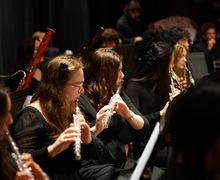Senior finds home in Syracuse, Latina community
Ally Moreo | Assistant Photo Editor
Senior Amy Quichiz has gotten involved in the Syracuse community, advocating for Latina and women's rights.
Amy Quichiz walked into her first class as a freshman at Syracuse University and saw that no one looked like her.
“I was scared to raise my hand,” Quichiz said.
Almost everyone in the classroom was a white man.
Quichiz spent her childhood distancing herself from her racial identity and heritage as a Latina, but upon coming to Syracuse, she began longing for a sense of support. Now a senior women’s and gender studies senior, Quichiz has immersed herself in the Latina and Syracuse community, advocating for her race.
A Latina of Colombian and Peruvian descent, Quichiz describes herself as a “combustion” of identities. American is not one of them — even though she was born and raised in the US. These feelings have only been exacerbated during this election season.
“At the end of the day, others are never going to see me as American,” she said, “Why would I claim something no one views me as?”
Quichiz said she has a dual personality between her physical location and cultural heritage, something many Latinas on Syracuse’s campus express.
“We are physically here, but emotionally and culturally engaged somewhere else,” said Yuliana Houlgin, Quichiz’s friend and a senior psychology major.
Growing up in a Colombian household in Queens, New York, Quichiz attended a high school that didn’t have a single white person in it. She spent most of her childhood attempting to separate herself from her heritage, describing herself as “whitewashed.”
“I didn’t want to listen to reggaeton, I didn’t want to watch salsa,” she said. “I disassociated myself from people of color.”
Quichiz said she was initially drawn to Syracuse and was confident in their promise of a high-quality education simply because white people attended it. But, after just a few weeks into school, Quichiz found herself missing her home and culture, and found few options to be a part of a community that related to her and her racial struggles.
Kiran Ramsey | Digital Design Editor
“In Latina households, you have more of a support system,” said Michelle Gonzalez, Quichiz’s roommate and a senior Latino-Latin American studies major. “In college, everyone has this mentality of ‘I figure it out, you figure it out.’”
Quichiz began taking women’s and gender studies classes, which she said changed her outlook on herself and those around her, and solidified her decision to pursue a major in the topic.
“I learned about why I didn’t love my body, my brown skin,” she said, “I realized I could teach other women how to love themselves.”
Later that year, Quichiz met another Latina student, who asked if she would be interested in founding a Latina sorority on campus. Quichiz said yes, and the two, joined by other Latinas in the SU community, formed Lambda Theta Alpha. The experience, Quichiz said, changed her life.
Quichiz said the sorority serves as a way for Latina women to come together and support one another. It is rooted in activism, centered around issues like domestic violence and sexual assault. Though many of the members come from different cultures and backgrounds, they have many of the same shared experiences. Many of her sisters are first generation college students, like her.
Activism is something we grew up with, it’s the only way our voice is heard and the only way I can make a difference for my people.
Michelle Gonzalez
Being around and learning from other women of color, especially Latina women, has helped Quichiz understand her own identity. Wanting to get even more involved, she decided to apply to be a part of the executive board for the student organization SASSE, that advocates against sexual assault.
Now the president of the organization, Quichiz organizes discussions focused around current events and gender-specific issues, such as media portrayal or politics. They most recently participated in the red tape demonstration on the Quad earlier this month, which protested SU’s communication as it relates to a Title IX investigation.
Although she doesn’t consider herself political, this election season makes it all but impossible to not speak up as a Latina, Quichiz said. Republican presidential candidate Donald Drumpf began his presidential run by calling Mexicans “rapists” and “criminals” in a speech announcing his candidacy. He then suggested building a wall separating Mexico and the United States.
Quichiz was volunteering at a refugee center in Mexico when Drumpf first proposed his wall idea and remembers the look on the refugees’ faces, many of whom were preparing to cross the border. She talked about the Republican candidate with disgust, calling him “ignorant,” but admitted the candidate simply represents the attitudes of many Americans today.
“People are saying, ‘Oh, look at what America has come to,’” she said, “and it’s like no, America has always been like this and now you are just realizing it.”
The thought of a world like this is scary to Quichiz. But, she simply sees it as a challenge for her and Latinas around the country to continue the fight: the fight against stereotypes, the fight for their rightful place in this country.

Lucy Naland | Senior Design Editor
Quichiz admits it can be hard to be living in a country she doesn’t personally identify with, but she reminds herself of old Chicanismo saying: “ni de aquí, ni de allá,” that translates into “I am not from here nor from there.”
“I am a woman who doesn’t belong anywhere,” Quichiz said, “I can go anywhere, I can be anyone. I am unique.”
Published on October 24, 2016 at 9:11 pm
Contact Hanna: hrhorvat@syr.edu





